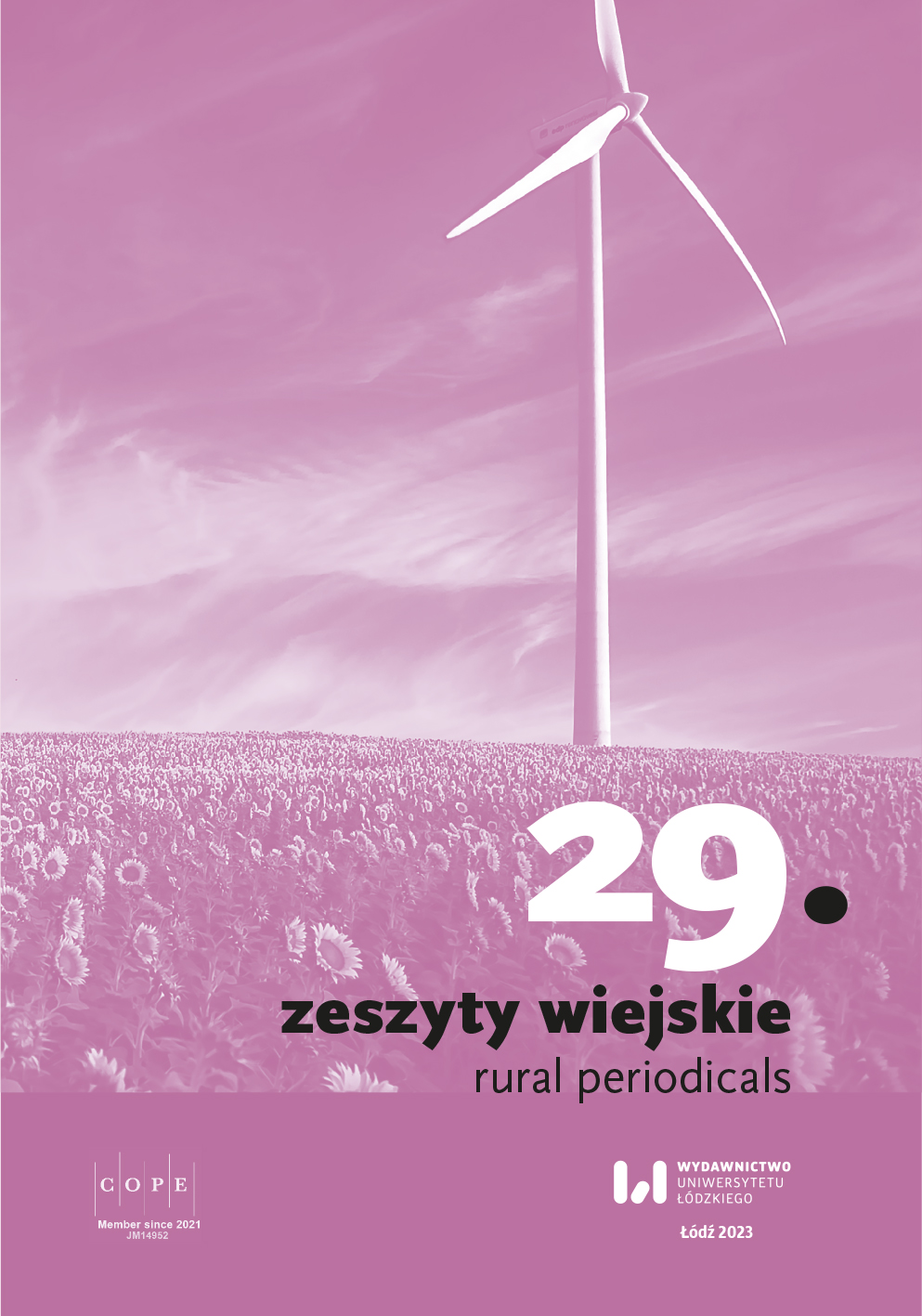"There is no store in Tarda again..." Some remarks on the functioning of rural communities in south-western Mazury on the example of Bartężek, Tarda and Winiec
DOI:
https://doi.org/10.18778/1506-6541.29.11Ключевые слова:
social crisis, cultural transformation, local community, private homeland, poverty, exclusion, stagnationАннотация
This article describes the economic and socio-cultural transformations experienced in recent decades by the communities of three villages, Bartężek, Tarda and Winiec, located in the western part of the Warmia-Mazury province. The immediate cause of these changes was the political and economic transformations that took place in Poland after 1989. However, the aftermath of the specific, and often predominantly negative, effects of these transformations are seen in the contemporary history of the region and its inhabitants; in particular, the challenge faced by the newly forming Polish state to domesticate, incorporate and unite – both administratively and economically, as well as (most importantly!) symbolically and culturally – the areas of the so-called Recovered Territories with the rest of the country. The great experiment, which was the formation of a new and modern society (in intention) of the Northern and Western Territories, was not successful everywhere. The localities and their inhabitants featured in the work are examples of this. Objective factors, mostly unemployment and transportation exclusion, which afflicted and partly continue to afflict the residents since the early 1990s, overlapped with the lack of sufficiently strong social and cultural ties binding the group together and with the inhabited space. The result of this process was a rapid exodus (if not flight) of primarily young people in search of income and a new place to live. This exodus determined the social and cultural condition of the described villages today, and perhaps many similar ones in the region. The article, using ethnographic detail, reveals the backstage of the economic and social collapse of the villages mentioned and the communities that comprise them, and points to the socio-cultural and symbolic causes of this process.
Скачивания
Библиографические ссылки
Interviews with residents of Bartężek, Tarda and Winiec – in possession of the author.
View in Google Scholar
Population Registration Department of the City and Municipality of Miłomłyn.
View in Google Scholar
Population Registration Department of the Morąg Municipal Office.
View in Google Scholar
Poznań University Library, sygn. 1518569 III, K. Walczak, Segmentaryzacja ubóstwa. Antropologiczne studium społeczności lokalnych w okresie regresu, Poznań 2005, PhD thesis written under the supervision of Prof. Wojciech Burszta, mpis.
View in Google Scholar
Bauman Z., “Zbędni, niechciani, odtrąceni – czyli o biednych w zamożnym świecie,” Kultura i Społeczeństwo 1998, vol. XVII, no. 2.
View in Google Scholar
Chyra-Rolicz Z., “Rola spółdzielczości ‘Samopomoc Chłopska’ w życiu wsi (1944–1989),” Zeszyty Wiejskie 2016, vol. 22.
View in Google Scholar
DOI: https://doi.org/10.18778/1506-6541.22.50
Fafiński W., “Leśnictwo,” [in:] Ostróda. Z dziejów miasta i okolic, ed. E. Kulig, Olsztyn 1976.
View in Google Scholar
Gawłowski K., Miejsce i rola PGR w polskim rolnictwie, Warszawa 1985.
View in Google Scholar
Jarosz D., Polityka władz komunistycznych w Polsce w latach 1948–1956 a chłopi, Warszawa 1998.
View in Google Scholar
Jasiewicz Z., “Wielokulturowość na tzw. Ziemiach Odzyskanych po II wojnie światowej. Rzeczywistość i reakcja nauki,” Sprawy Narodowościowe 1999, vol. 14–15.
View in Google Scholar
Kielar M., “Poza ideologicznymi podziałami. Wybrane aspekty ‘stawania się ojczyzny’ w mazurskich wsiach,” Borussia 2000, no. 20/21.
View in Google Scholar
Kokot J., Brożek A., Rauziński R., “Stosunki narodowościowe i społeczne na Ziemiach Zachodnich i Północnych na tle stosunków sprzed II wojny światowej,” [in:] Problemy demograficzne Ziem Zachodnich i Północnych PRL. Materiały z konferencji 14 i 15 X 1968, Warszawa 1968.
View in Google Scholar
Kosiński L., Procesy ludnościowe na Ziemiach Odzyskanych w latach 1945–1960, Warszawa 1963.
View in Google Scholar
Leydin G., “Z dziejów,” [in:] Morąg. Z dziejów miasta i powiatu, collective ed., Olsztyn 1973.
View in Google Scholar
Lietz Z., “Z dziejów wsi,” [in:] Ostróda. Z dziejów miasta i okolic, ed. A. Wakar, Olsztyn 1975.
View in Google Scholar
Łach S., Osadnictwo wiejskie na Ziemiach Zachodnich i Północnych Polski w latach 1945–1950, Słupsk 1983.
View in Google Scholar
Łukowski W., Społeczne tworzenie ojczyzn. Studium tożsamości mieszkańców Mazur, Warszawa 2002.
View in Google Scholar
Machałek M., “Likwidacja Państwowych Gospodarstw Rolnych i pierwszy etap przekształceń własnościowych państwowego sektora rolnego. Przyczynek do badań,” Roczniki Dziejów Społecznych i Gospodarczych 2022, vol. LXXXIV.
View in Google Scholar
DOI: https://doi.org/10.12775/RDSG.2022.09
Niedzielski E., Wilamowski B., “Rolnictwo,” [in:] Ostróda. Z dziejów miasta i okolic, ed. E. Kulig, Olsztyn 1976.
View in Google Scholar
Sakson A., “Ideologia wielokulturowości w konfrontacji z problematyką polityczną na Ziemiach Zachodnich i Północnych,” Sprawy Narodowościowe 1999, vol. 14–15.
View in Google Scholar
Sakson A., Stosunki narodowościowe na Warmii i Mazurach 1945–1997, Poznań 1998.
View in Google Scholar
Szpak E., Między osiedlem a zagrodą. Życie codzienne mieszkańców PGR-ów, Warszawa 2005.
View in Google Scholar
Tarkowska E., “Bieda popegeerowska,” [in:] Zrozumieć biednego. O dawnej i obecnej biedzie w Polsce, ed. E. Tarkowska, Warszawa 2000.
View in Google Scholar
Zabłocki G., Sobczak M., Piszczek E., Kwiecińska M., Ubóstwo na terenach wiejskich północnej Polski, Toruń 1999.
View in Google Scholar
Загрузки
Опубликован
Как цитировать
Выпуск
Раздел
Лицензия

Это произведение доступно по лицензии Creative Commons «Attribution-NonCommercial-NoDerivatives» («Атрибуция — Некоммерческое использование — Без производных произведений») 4.0 Всемирная.











